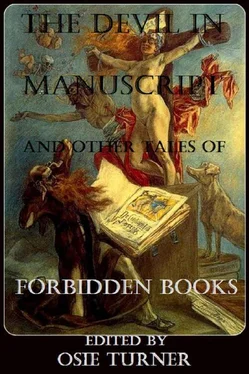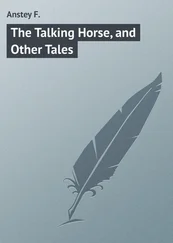Натаниель Готорн - The Devil in Manuscript and Other Tales of Forbidden Books
Здесь есть возможность читать онлайн «Натаниель Готорн - The Devil in Manuscript and Other Tales of Forbidden Books» весь текст электронной книги совершенно бесплатно (целиком полную версию без сокращений). В некоторых случаях можно слушать аудио, скачать через торрент в формате fb2 и присутствует краткое содержание. Год выпуска: 2013, Издательство: The Forlorn Press, Жанр: Ужасы и Мистика, на английском языке. Описание произведения, (предисловие) а так же отзывы посетителей доступны на портале библиотеки ЛибКат.
- Название:The Devil in Manuscript and Other Tales of Forbidden Books
- Автор:
- Издательство:The Forlorn Press
- Жанр:
- Год:2013
- ISBN:нет данных
- Рейтинг книги:5 / 5. Голосов: 1
-
Избранное:Добавить в избранное
- Отзывы:
-
Ваша оценка:
- 100
- 1
- 2
- 3
- 4
- 5
The Devil in Manuscript and Other Tales of Forbidden Books: краткое содержание, описание и аннотация
Предлагаем к чтению аннотацию, описание, краткое содержание или предисловие (зависит от того, что написал сам автор книги «The Devil in Manuscript and Other Tales of Forbidden Books»). Если вы не нашли необходимую информацию о книге — напишите в комментариях, мы постараемся отыскать её.
The Devil in Manuscript and Other Tales of Forbidden Books — читать онлайн бесплатно полную книгу (весь текст) целиком
Ниже представлен текст книги, разбитый по страницам. Система сохранения места последней прочитанной страницы, позволяет с удобством читать онлайн бесплатно книгу «The Devil in Manuscript and Other Tales of Forbidden Books», без необходимости каждый раз заново искать на чём Вы остановились. Поставьте закладку, и сможете в любой момент перейти на страницу, на которой закончили чтение.
Интервал:
Закладка:
“I know I can,” Laidlaw said simply, as he followed him in.
An hour later they passed back into the front room again. The sun was already behind the houses opposite, and the shadows began to gather.
“I went off easily?” Laidlaw asked.
“You were a little obstinate at first. But though you came in like a lion, you went out like a lamb. I let you sleep a bit afterwards.”
Dr. Stephen kept his eyes rather steadily upon his friend’s face.
“What were you doing by the fire before you came here?” he asked, pausing, in a casual tone, as he lit a cigarette and handed the case to his patient.
“I? Let me see. Oh, I know; I was worrying my way through poor old Ebor’s papers and things. I’m his executor, you know. Then I got weary and came out for a whiff of air.” He spoke lightly and with perfect naturalness. Obviously he was telling the truth. “I prefer specimens to papers,” he laughed cheerily.
“I know, I know,” said Dr. Stephen, holding a lighted match for the cigarette. His face wore an expression of content. The experiment had been a complete success. The memory of the last two hours was wiped out utterly. Laidlaw was already chatting gaily and easily about a dozen other things that interested him. Together they went out into the street, and at his door Dr. Stephen left him with a joke and a wry face that made his friend laugh heartily.
“Don’t dine on the professor’s old papers by mistake,” he cried, as he vanished down the street.
Dr. Laidlaw went up to his study at the top of the house. Half way down he met his housekeeper, Mrs. Fewings. She was flustered and excited, and her face was very red and perspiring.
“There’ve been burglars here,” she cried excitedly, “or something funny! All your things is just anyhow, sir. I found everything all about everywhere!” She was very confused. In this orderly and very precise establishment it was unusual to find a thing out of place.
“Oh, my specimens!” cried the doctor, dashing up the rest of the stairs at top speed. “Have they been touched or——”
He flew to the door of the laboratory. Mrs. Fewings panted up heavily behind him.
“The labatry ain’t been touched,” she explained, breathlessly, “but they smashed the libry clock and they’ve ’ung your gold watch, sir, on the skelinton’s hands. And the books that weren’t no value they flung out er the window just like so much rubbish. They must have been wild drunk, Dr. Laidlaw, sir!”
The young scientist made a hurried examination of the rooms. Nothing of value was missing. He began to wonder what kind of burglars they were. He looked up sharply at Mrs. Fewings standing in the doorway. For a moment he seemed to cast about in his mind for something.
“Odd,” he said at length. “I only left here an hour ago and everything was all right then.”
“Was it, sir? Yes, sir.” She glanced sharply at him. Her room looked out upon the courtyard, and she must have seen the books come crashing down, and also have heard her master leave the house a few minutes later.
“And what’s this rubbish the brutes have left?” he cried, taking up two slabs of worn gray stone, on the writing-table. “Bath brick, or something, I do declare.”
He looked very sharply again at the confused and troubled housekeeper.
“Throw them on the dust heap, Mrs. Fewings, and—and let me know if anything is missing in the house, and I will notify the police this evening.”
When she left the room he went into the laboratory and took his watch off the skeleton’s fingers. His face wore a troubled expression, but after a moment’s thought it cleared again. His memory was a complete blank.
“I suppose I left it on the writing-table when I went out to take the air,” he said. And there was no one present to contradict him.
He crossed to the window and blew carelessly some ashes of burned paper from the sill, and stood watching them as they floated away lazily over the tops of the trees.
P.’s Correspondence
By
Nathaniel Hawthorne
My unfortunate friend P. has lost the thread of his life by the interposition of long intervals of partially disordered reason. The past and present are jumbled together in his mind in a manner often productive of curious results, and which will be better understood after the perusal of the following letter than from any description that I could give. The poor fellow, without once stirring from the little whitewashed, iron-grated room to which he alludes in his first paragraph, is nevertheless a great traveller, and meets in his wanderings a variety of personages who have long ceased to be visible to any eye save his own. In my opinion, all this is not so much a delusion as a partly wilful and partly involuntary sport of the imagination, to which his disease has imparted such morbid energy that he beholds these spectral scenes and characters with no less distinctness than a play upon the stage, and with somewhat more of illusive credence. Many of his letters are in my possession, some based upon the same vagary as the present one, and others upon hypotheses not a whit short of it in absurdity. The whole form a series of correspondence, which, should fate seasonably remove my poor friend from what is to him a world of moonshine, I promise myself a pious pleasure in editing for the public eye. P. had always a hankering after literary reputation, and has made more than one unsuccessful effort to achieve it. It would not be a little odd, if, after missing his object while seeking it by the light of reason, he should prove to have stumbled upon it in his misty excursions beyond the limits of sanity.
MY DEAR FRIEND: Old associations cling to the mind with astonishing tenacity. Daily custom grows up about us like a stone wall, and consolidates itself into almost as material an entity as mankind’s strongest architecture. It is sometimes a serious question with me whether ideas be not really visible and tangible, and endowed with all the other qualities of matter. Sitting as I do at this moment in my hired apartment, writing beside the hearth, over which hangs a print of Queen Victoria, listening to the muffled roar of the world’s metropolis, and with a window at but five paces distant, through which, whenever I please, I can gaze out on actual London,—with all this positive certainty as to my whereabouts, what kind of notion, do you think, is just now perplexing my brain? Why,—would you believe it?—that all this time I am still an inhabitant of that wearisome little chamber,—that whitewashed little chamber,—that little chamber with its one small window, across which, from some inscrutable reason of taste or convenience, my landlord had placed a row of iron bars,—that same little chamber, in short, whither your kindness has so often brought you to visit me! Will no length of time or breadth of space enfranchise me from that unlovely abode? I travel; but it seems to be like the snail, with my house upon my head. Ah, well! I am verging, I suppose, on that period of life when present scenes and events make but feeble impressions in comparison with those of yore; so that I must reconcile myself to be more and more the prisoner of Memory, who merely lets me hop about a little with her chain around my leg.
My letters of introduction have been of the utmost service, enabling me to make the acquaintance of several distinguished characters who, until now, have seemed as remote from the sphere of my personal intercourse as the wits of Queen Anne’s time or Ben Jenson’s compotators at the Mermaid. One of the first of which I availed myself was the letter to Lord Byron. I found his lordship looking much older than I had anticipated, although, considering his former irregularities of life and the various wear and tear of his constitution, not older than a man on the verge of sixty reasonably may look. But I had invested his earthly frame, in my imagination, with the poet’s spiritual immortality. He wears a brown wig, very luxuriantly curled, and extending down over his forehead. The expression of his eyes is concealed by spectacles. His early tendency to obesity having increased, Lord Byron is now enormously fat,—so fat as to give the impression of a person quite overladen with his own flesh, and without sufficient vigor to diffuse his personal life through the great mass of corporeal substance which weighs upon him so cruelly. You gaze at the mortal heap; and, while it fills your eye with what purports to be Byron, you murmur within yourself, “For Heaven’s sake, where is he?” Were I disposed to be caustic, I might consider this mass of earthly matter as the symbol, in a material shape, of those evil habits and carnal vices which unspiritualize man’s nature and clog up his avenues of communication with the better life. But this would be too harsh; and, besides, Lord Byron’s morals have been improving while his outward man has swollen to such unconscionable circumference. Would that he were leaner; for, though he did me the honor to present his hand, yet it was so puffed out with alien substance that I could not feel as if I had touched the hand that wrote Childe Harold.
Читать дальшеИнтервал:
Закладка:
Похожие книги на «The Devil in Manuscript and Other Tales of Forbidden Books»
Представляем Вашему вниманию похожие книги на «The Devil in Manuscript and Other Tales of Forbidden Books» списком для выбора. Мы отобрали схожую по названию и смыслу литературу в надежде предоставить читателям больше вариантов отыскать новые, интересные, ещё непрочитанные произведения.
Обсуждение, отзывы о книге «The Devil in Manuscript and Other Tales of Forbidden Books» и просто собственные мнения читателей. Оставьте ваши комментарии, напишите, что Вы думаете о произведении, его смысле или главных героях. Укажите что конкретно понравилось, а что нет, и почему Вы так считаете.












